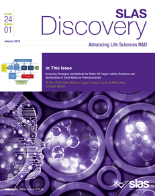
SLAS Discovery
Scope & Guideline
Fostering Collaboration through Open Access Research
Introduction
Aims and Scopes
- High-Throughput Screening (HTS):
The journal extensively covers the development and optimization of high-throughput screening methodologies for drug discovery, enabling rapid evaluation of large compound libraries against biological targets. - Cell-Based Assays and Imaging:
SLAS Discovery emphasizes the use of cell-based assays, including high-content imaging and 3D cell cultures, to better mimic in vivo conditions and enhance the relevance of screening results. - Target Identification and Validation:
Research published in the journal often focuses on novel strategies for target identification and validation, including the application of proteomics and genomics to discover new drug targets. - Automation and Robotics in Drug Discovery:
The journal highlights advancements in automation and robotics that facilitate efficient assay development and compound screening, improving reproducibility and data quality in drug discovery. - Phenotypic Screening:
SLAS Discovery also explores phenotypic screening approaches that assess biological responses to compounds in cellular models, offering insights into complex drug action mechanisms. - Emerging Technologies:
The journal is dedicated to showcasing emerging technologies such as artificial intelligence (AI) and machine learning (ML) in drug discovery, aiming to enhance data analysis and predictive capabilities.
Trending and Emerging
- COVID-19 Therapeutics:
A significant number of recent publications are dedicated to discovering and validating therapeutics for COVID-19, reflecting the urgent need for effective treatments and the journal's responsiveness to global health challenges. - 3D Cell Culture and Organoids:
There is a growing trend towards the use of 3D cell culture systems and organoids, which provide more accurate representations of human tissues, enhancing drug screening and development processes. - Artificial Intelligence and Machine Learning:
The integration of AI and machine learning techniques into drug discovery processes is on the rise, with studies focusing on data mining, predictive modeling, and automated analysis to streamline hit identification. - Targeted Protein Degradation:
Research on targeted protein degradation, particularly using PROTACs (Proteolysis Targeting Chimeras), is emerging as a significant area of interest, offering new strategies for drug discovery against challenging targets. - Synergistic Drug Combinations:
There is an increasing focus on identifying synergistic drug combinations to enhance therapeutic efficacy, particularly in cancer treatment, which reflects a shift towards personalized medicine approaches.
Declining or Waning
- Traditional Biochemical Assays:
There is a noticeable decline in publications focusing solely on traditional biochemical assays, as the field moves towards more complex and physiologically relevant models. - Single-Dimensional Drug Screening:
Research centered around single-dimensional drug screening methods is waning, with a shift towards more integrated and multi-parametric approaches that provide a broader understanding of drug effects. - Basic Pharmacology Studies:
Basic pharmacology studies that do not incorporate advanced technologies or high-throughput capabilities appear to be less frequent, as there is a growing emphasis on translational research and clinical relevance. - In Vitro Models Lacking Complexity:
The use of simplistic in vitro models is decreasing, as researchers prioritize more complex systems that better replicate human physiology, such as organoids and multi-cellular models. - Focus on Established Targets:
There is a reduction in studies targeting well-characterized pathways or proteins, as the field increasingly seeks novel targets and mechanisms of action to overcome drug resistance.
Similar Journals
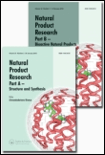
NATURAL PRODUCT RESEARCH
Exploring the Essence of Nature's CompoundsNATURAL PRODUCT RESEARCH is a distinguished journal published by Taylor & Francis Ltd, dedicated to advancing the field of natural product science through the dissemination of high-quality research. Established in 2003, this journal serves as a pivotal platform for scholars in Analytical Chemistry, Biochemistry, Organic Chemistry, and Plant Science, boasting an impressive categorization including Q2 in Plant Science and Q3 in the other disciplines for 2023. With a current Scopus ranking that highlights its significance within various scientific communities, NATURAL PRODUCT RESEARCH reflects the complexities and innovations associated with natural compounds and their applications. Researchers, professionals, and students will find valuable insights and breakthroughs that contribute to the understanding of bioactive compounds and their roles in health and environmental sustainability. Access options are available, ensuring that the latest findings are accessible to a global audience. As this journal continues to publish until 2024, it remains an essential resource for those at the forefront of natural product research.
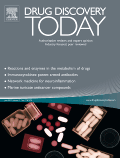
DRUG DISCOVERY TODAY
Pioneering Insights in Pharmacology and Drug DevelopmentDRUG DISCOVERY TODAY is a premier journal published by Elsevier Science Ltd, providing a vital platform for researchers, professionals, and students dedicated to the fields of drug discovery and pharmacology. With the ISSN 1359-6446 and E-ISSN 1878-5832, this esteemed journal has positioned itself at the forefront of scientific literature since its inception in 1996, boasting an impressive convergence set to last until 2024. Recognized for its rigorous peer-review process and high-quality publications, DRUG DISCOVERY TODAY attained a prestigious Q1 ranking in both Drug Discovery and Pharmacology categories for 2023, reflecting its significant impact and relevance in the field. With Scopus rankings placing it within the top percentile, at ranks #9 in Drug Discovery and #17 in Pharmacology out of over 300 journals, this journal serves as a crucial resource for the latest advancements and innovations in drug development. Although it does not offer Open Access, its comprehensive scope encompasses the most recent research, reviews, and insights, making DRUG DISCOVERY TODAY an essential read for anyone seeking to advance their knowledge and practice in pharmaceutical sciences.
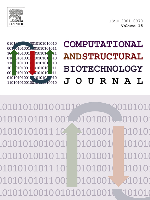
Computational and Structural Biotechnology Journal
Bridging Disciplines to Transform Biotechnology ResearchComputational and Structural Biotechnology Journal is a premier open-access journal published by Elsevier, focusing on the intersection of computer science and molecular biology. Since its inception in 2012, the journal has established itself as a leading platform for innovative research, featuring groundbreaking studies in biochemistry, biophysics, biotechnology, and genetics. With a remarkable Q1 ranking in multiple categories, including Biochemistry and Genetics, it stands out for its high impact, evidenced by its strong Scopus ranking percentile scores. As a vital resource for researchers, professionals, and students, the journal aims to foster the dissemination of essential findings that leverage computational techniques to explore complex biological systems. In a rapidly evolving scientific landscape, Computational and Structural Biotechnology Journal serves as an indispensable resource for those looking to contribute and stay abreast of major advancements in the field.
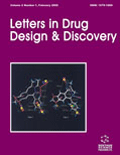
Letters in Drug Design & Discovery
Transforming Ideas into Breakthroughs in Drug DesignLetters in Drug Design & Discovery is an esteemed journal dedicated to advancing the fields of Drug Discovery and Molecular Medicine. Published by Bentham Science Publishers, this journal offers a platform for the dissemination of innovative research and advanced methodologies, enhancing collaboration among researchers and professionals in pharmaceutical sciences. Despite its current Q4 ranking in Drug Discovery and Molecular Medicine and Q3 in Pharmaceutical Science for 2023, the journal is committed to improving its presence in the academic community by providing quality, peer-reviewed publications that cover various aspects of drug design and discovery, including novel therapeutic approaches and methodologies. With a focus on both foundational and cutting-edge research from around the globe, Letters in Drug Design & Discovery is pivotal for those seeking to stay abreast of developments in drug development and molecular research. Researchers are encouraged to submit their work, engage with the burgeoning field, and contribute to the ongoing dialogue driven by this journal, which spans the years from 2005 to 2024. While the journal does not currently offer open access, its contributions remain accessible to a wide range of academic and professional audiences.

ASSAY AND DRUG DEVELOPMENT TECHNOLOGIES
Advancing the Frontiers of Pharmacology and Drug DevelopmentASSAY AND DRUG DEVELOPMENT TECHNOLOGIES is a peer-reviewed journal published by Mary Ann Liebert, Inc., focused on the innovative fields of pharmacology and drug development. With its ISSN 1540-658X and E-ISSN 1557-8127, the journal has successfully contributed to the scientific community since its inception in 2002, converging into one comprehensive resource by 2024. Positioned in the Q3 quartile for Drug Discovery and Q4 for Molecular Medicine as per the 2023 rankings, the journal is dedicated to disseminating cutting-edge research that addresses the complexities of drug assay techniques and their implications in therapeutics. Although currently not an open-access publication, it offers significant insights and findings valuable to researchers, professionals, and students in the realm of biochemistry and pharmacology. With a commitment to advancing knowledge and innovation, ASSAY AND DRUG DEVELOPMENT TECHNOLOGIES continues to be an essential platform for the latest advancements in drug discovery and development.
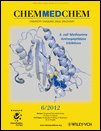
ChemMedChem
Advancing the frontiers of medicinal chemistry.ChemMedChem is a leading international journal published by WILEY-V C H VERLAG GMBH in the United Kingdom, specializing in the interdisciplinary fields of medicinal chemistry and drug discovery. With a commendable impact factor that places it in the Q1 quartile for Organic Chemistry and among the Q2 ranks in several other key categories including Biochemistry, Molecular Medicine, and Pharmacology, ChemMedChem serves as a vital platform for the dissemination of innovative research and transformative insights in the development of pharmaceutical agents. Since its inception in 2006, this journal has been at the forefront of advancing knowledge that bridges the gap between fundamental research and practical applications in medicine, making it an essential resource for researchers, professionals, and students alike. Although it currently does not offer Open Access options, the journal ensures high-quality peer-reviewed content that engages its audience and fosters collaborative scientific discourse.
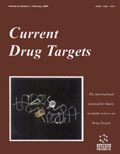
CURRENT DRUG TARGETS
Transforming Drug Targets into Therapeutic TriumphsCURRENT DRUG TARGETS is a leading peer-reviewed journal dedicated to advancements in the fields of Clinical Biochemistry, Drug Discovery, Molecular Medicine, and Pharmacology. Published by Bentham Science Publishers Ltd, this esteemed journal has solidified its position in the academic community with a 2023 Q2 ranking in several categories, highlighting its influence and relevance in drug research and development. With an ISSN of 1389-4501 and E-ISSN 1873-5592, CURRENT DRUG TARGETS facilitates the dissemination of high-quality articles that explore novel therapeutic strategies and drug design principles. Catered to researchers, professionals, and students, the journal has a commitment to advancing knowledge while addressing contemporary challenges in pharmacological sciences. As it converges from 2000 to 2024, CURRENT DRUG TARGETS remains a vital resource in understanding the complexities of drug action and interaction, making it indispensable for anyone pursuing cutting-edge research in related disciplines.

Digital Discovery
Connecting Researchers in the Evolving Landscape of Digital ScienceDigital Discovery is an innovative journal published by the Royal Society of Chemistry, specializing in the rapidly evolving field of digital chemistry and computational methods. Launched in 2022, this Open Access journal allows unrestricted access to cutting-edge research, which enhances the visibility and dissemination of scientific findings. With an impressive Q1 category ranking in Chemistry (miscellaneous) for 2023, Digital Discovery stands out as a pivotal platform for researchers looking to explore the intersections of digital innovation and chemical sciences. The journal is dedicated to publishing high-quality, peer-reviewed articles that push the boundaries of knowledge in this critical area of study, making it an essential resource for academics, industry professionals, and students alike. Readers can access all articles freely online, promoting a collaborative and inclusive academic community.
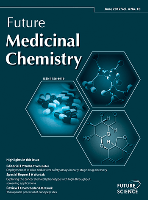
Future Medicinal Chemistry
Advancing the frontiers of drug discovery.Future Medicinal Chemistry is a premier journal dedicated to the rapidly evolving fields of drug discovery, pharmacology, and molecular medicine. Published by Newlands Press Ltd in the United Kingdom, this journal has garnered significant attention within the academic community, evidenced by its 2023 category rankings in Scopus, placing it in the Q2 quartile for Drug Discovery and the Q3 quartiles for both Molecular Medicine and Pharmacology. With an ISSN of 1756-8919 and an E-ISSN of 1756-8927, Future Medicinal Chemistry has been a cornerstone of scholarly discourse since its inception in 2009, continuously contributing to the advancement of knowledge and discussion in medicinal chemistry. The journal is committed to publishing high-quality, peer-reviewed research that addresses the challenges and innovations in drug development and therapeutic strategies, making it an essential resource for researchers, professionals, and students seeking to stay at the forefront of these critical fields. Engage with the latest findings and methodologies that shape the future of medicine by exploring the wealth of information offered within Future Medicinal Chemistry.
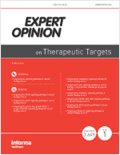
EXPERT OPINION ON THERAPEUTIC TARGETS
Empowering researchers with cutting-edge perspectives on treatment targets.Expert Opinion on Therapeutic Targets, published by Taylor & Francis Ltd, is a highly respected journal in the fields of Clinical Biochemistry, Drug Discovery, Molecular Medicine, and Pharmacology. With a focus on cutting-edge research and innovative approaches to therapeutic development, this journal has established itself as a leading platform for scholars and practitioners, boasting a prestigious Q1 ranking across multiple categories in 2023. The journal aims to present expert perspectives on novel therapeutic strategies, promising drug candidates, and insights into the intricate mechanisms underlying various diseases. Its impressive impact factor reflects the journal's commitment to advancing scientific knowledge and influencing clinical practice. With its inception in 1997 and ongoing publication through to 2024, Expert Opinion on Therapeutic Targets continues to be an invaluable resource for those seeking to stay at the forefront of therapeutic innovations.